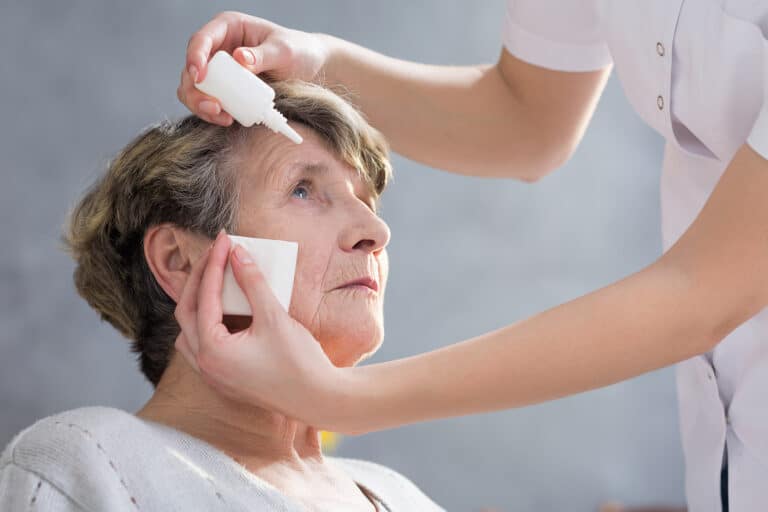February is Low Vision Awareness Month and now is the perfect time to make an appointment for your mom or dad to get their vision checked. Changes in your mom or dad’s vision become more common as they get older, which is one of the reasons why seniors should have regular vision screenings.
Changes in vision can also indicate a more serious eye health condition. Seniors who are developing cataracts or who are in the early stages of an eye disease may experience changes to their vision and not realize that those changes aren’t just a normal part of aging.
If your mom or dad has been diagnosed with low vision and you’re worried about their ability to safely live alone senior home care can help. A senior home care provider can help your mom or dad continue to live independently by helping with housework, cooking, and other chores that might be too difficult for your mom or dad to do with vision problems.
Yearly vision screenings are a must for seniors. But, if you notice that your mom or dad is experiencing any of these common symptoms of low vision or eye disease you should make sure they get checked out by an eye doctor soon:
Difficulty Reading or Seeing Small Details
One of the first signs of vision trouble in seniors is difficulty reading or seeing fine details. You might notice your mom or dad squinting to read menus, books, or phone screens. They may also complain about print being too small or hold items farther away to see them more clearly.
This could be due to presbyopia, a normal part of aging where the eyes lose the ability to focus on close objects. However, if your mom or dad’s vision worsens or isn’t corrected by glasses, it could indicate cataracts, macular degeneration, or other vision problems that require medical attention.
Frequent Tripping or Bumping into Objects
If your mom or dad starts tripping, stumbling, or bumping into furniture, it might be more than clumsiness.
Vision issues like peripheral vision loss or depth perception problems can make navigating their surroundings difficult. This could be a sign of glaucoma, which damages the optic nerve and causes vision loss starting at the edges.
Another possibility is cataracts, which cloud the lens of the eye and blur vision, making it hard to judge distances or spot obstacles. A vision screening will help your mom or dad’s doctor find out what is causing changes in their vision.
Difficulty Recognizing Faces or Objects
If your parent seems to have trouble recognizing familiar faces or objects, it could indicate macular degeneration. This condition affects the central part of vision, making it hard to see details clearly while peripheral vision remains intact.
They might also experience distorted vision, where straight lines appear wavy or objects look blurry. This can interfere with their ability to read, be online, or enjoy activities like watching TV.
Changes in Eye Appearance or Behavior
Physical changes in the eyes or how your mom or dad uses them can be signs of trouble. Watch for symptoms like:
- Redness, swelling, or cloudiness in the eyes.
- Watery eyes or frequent rubbing.
- Difficulty keeping their eyes open or a noticeable squint.
These symptoms could point to dry eye syndrome, infections, or other eye conditions. Sudden changes, like one eye turning inward or outward, could indicate a serious problem like a stroke or nerve damage and should be addressed immediately.
If you or an aging loved one are considering Senior Home Care in McLean, VA, please contact the caring staff at Access Home Care Inc today! Call (703) 765-9350
Access Home Care provider in Arlington, Alexandria, Leesburg, Reston, Herndon, Manassas, Ashburn, Falls Church, McLean, Lorton, Springfield, Woodbridge, Fairfax, Virginia and the surrounding communities.
“My desire to enter into nursing started when one of my older sisters died of kidney disease due to lack of care. At age 15, I decided to enter into nursing so that I could provide quality care to patients.Upon arrival in United States at 21 years of age, I enrolled in T.C Willliams School of Practical Nursing while working as a nursing assistant at a nursing home. I also worked as a part-time home health aide to take of the elderly. After completion of my practical nurse education, I worked in geriatric psychiatry unit at Dominion Hospital and Arlington Correctional facility mental health unit.
I completed Marymount University in 2001 and entered into Home Care as a field case manager.
I held that position for 2 years and as an Administrator, and for another 2 years until Access Home Care was found in 2004."
Today, Access Home Care has over 300 employees and 286 clients.
- Personal Care at Home Helps Seniors Stuck at Home Connect With Others - April 17, 2025
- Five Tips for Living with Chronic Lower Back Pain - April 3, 2025
- How 24-Hour Home Care Is Different From Other Types Of Care - March 19, 2025



